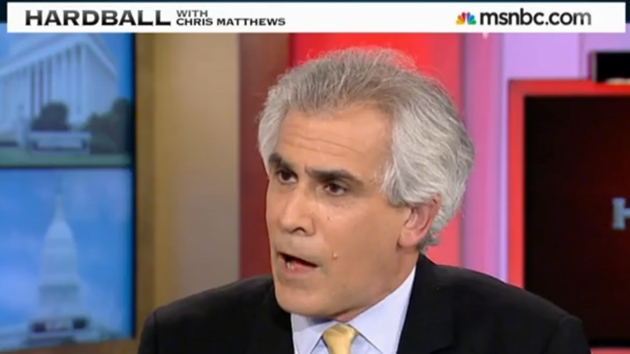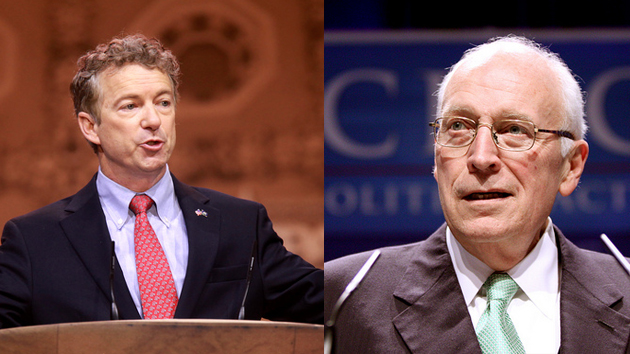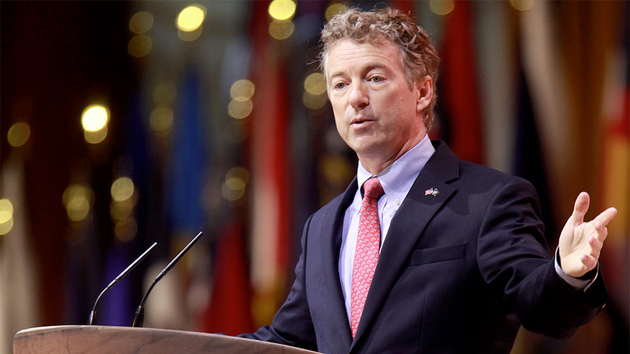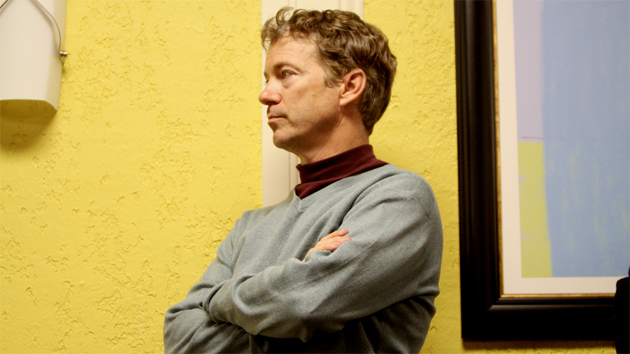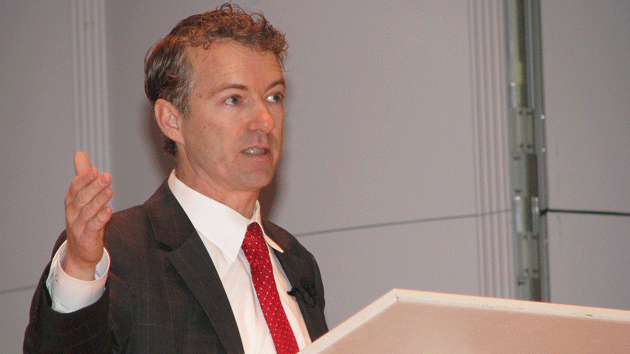
<a href="https://www.flickr.com/photos/circulating/4364341436/in/photolist-7DEoE9-7DHxaU-84zxRM-e2Zjiz-8PFhnZ-aMte5v-85TAaw-83R9Af-87NNUy-dP6fbr-h8CT2R-fCZG1r-h8BycG-h8CUrK-h8Buxr-h8BBjJ-h8CRm6-7DG9my-845tKy-7DDpQj-7DH4aS-7DzNiX-7DD1pK-7DEfXE-7DCUJ4-7DGYVy-7DH1Kj-7DD2MV-7DGRGb-7DGJey-a1xCEA-a1uKQi-7D3aaK-8PtDWE-8PtDHG-8Q6MvE-8NKvmp-8bzjDd-8CZ4kK-8jkFv4-8Rh7XK-8Pqzmz-7DvaWe-7DDiVk-84VKh1-7DDruW-7D3Q6r-e9pP6T-i6QS5m-84VKgo">circulating</a>/Flickr
On the Sunday morning television shows this past weekend—against the backdrop of an Iraq in flames—former Vice President Dick Cheney and Sen. Rand Paul (R-Ky.) continued their ongoing feud and the battle for the (national security) soul of the Republican Party. In recent months, as Mother Jones has reported that Paul in 2009 accused Cheney of using 9/11 as an excuse to launch the Iraq invasion to benefit Halliburton (the corporation Cheney once led) and called on the GOP to disassociate itself with the former vice president, Cheney’s allies have slammed the senator for expressing reckless positions. During a private speech in March, without mentioning Paul by name, Cheney contended that Paul’s skepticism about US intervention abroad would endanger the United States. On ABC News’ This Week on Sunday, Cheney explicitly assailed Paul as “basically an isolationist”—a term of profound derision in the neocon wing of the GOP. Meanwhile, on Meet the Press, Paul was asked if Cheney could be considered a credible critic of President Barack Obama’s foreign policy, and Paul, without saying Cheney’s name, replied, “The same questions could be asked of those who supported the Iraq war. You know, were they right in their predictions? Were there weapons of mass destruction there? That’s what the war was sold on. Was democracy easily achievable?…They didn’t really, I think, understand the civil war that would break out.” This was obviously a jab at the former vice president.
But though Paul, who is mulling a 2016 presidential bid, has not hesitated to challenge the hawks of the GOP, he has softened his language. He no longer accuses Cheney of pushing the Iraq war to reap corporate profits. (He even recently claimed that was not what he had meant to say.) And in these latest rounds, Paul has not voiced his previously stated view that the GOP is the party of war-mongers at odds with true Christian beliefs.
It was only a year ago that Paul described the Republican Party as overly enthusiastic for war. During a little-noticed interview with the Christian Broadcast Network, Paul remarked, “Part of Republicans’ problems—and frankly, to tell you the truth, some in the evangelical Christian movement—I think [they] have appeared too eager for war.” This was a stark assessment of his own party.
Paul went further, noting that these Republicans and evangelicals were not in sync with Jesus:
When people come to me and they’re lobbying for ratcheting up some sort of bellicose policy towards one country, even if it’s a bad country, I tell them that and when I read the New Testament, that when I read about Jesus, I don’t see him involved, he wasn’t really involved with the wars of his days. And, in fact, people rebuked him for not being [what] they wanted. They wanted somebody to stand up to the Romans. He stood up in a different sort of way, but he didn’t organize coalitions and guerrilla bands and arm them. Now I’m not saying that you shouldn’t have people who want to defend against evil, bad forces around the world, but I think you need to remember that he was the prince of peace, you know, we’re talking about “blessed are the peacemakers,” not “blessed are the war-makers.”
In his recent tussle with Cheney, Paul has been more diplomatic and not accused the GOP of being out of step with Jesus. Asked on Meet the Press if he were a “‘Dick Cheney Republican’ when it comes to American power in the Middle East,” Paul offered a restrained response: “What I would say is that the [Iraq] war emboldened Iran.” He did not take a direct swipe at Cheney or the Republican Party.
Paul does have a long record of challenging basic GOP foreign policy tenets with rhetoric that would tend to drive a GOP hawk crazy. In 2008, while he was supporting his father’s presidential effort, Paul, at a Montana event, said, “we need to figure out what is going on with terrorism, we need to figure out why they attack us.” He added, “some Republicans don’t want to hear this.” He went on to describe US troops in Iraq as an “occupying” force and, as a way of explaining the attacks on US forces there, Paul noted that if Chinese soldiers were stationed in a base in the United States, “we’d be setting roadside bombs blowing up the Chinese soldiers as they came off the base.” No doubt, a neocon could read these remarks as practically justifying insurgent attacks against the United States. And in a video he made for his 2010 Senate campaign, Paul claimed that the pre-war intelligence “was manipulated.” Though he did not say who engaged in this manipulation, this was a serious accusation—practically a charge of treason—aimed against Republicans, presumably including Cheney. (Paul also noted that there was enormous waste in the Pentagon and that “we need to make sure that…we don’t define all military spending as toward national defense.”)
In a national security speech he delivered in January, Paul joked that much of foreign policy is name-calling and “it seems the only thing for certain is that if you don’t label yourself first, your enemies will.” He noted that neocons are too fast to disparage diplomatic engagement and choose military action: “The irony is that this crowd that wants to project power does it from inside an echo chamber that isolates itself from negotiation because ‘foreigners’ aren’t to be trusted.” Paul contended that necons have embraced a “neo-isolationism in which diplomacy is distrusted and war is, if not the first choice, the preferred option.”
This was a clever formulation—and a much more high-minded way of criticizing Republican hawks than Paul has previously deployed. In his recent dueling with Cheney and the neocons, Paul has eschewed his sharper critiques of the GOP. As he tries to broaden his political appeal—perhaps in preparation for a presidential bid— Paul has sheathed the harsher accusations and rhetoric. But as 2016 approaches and the battle for the GOP heats up, two questions remain: will Paul be able to continue practicing restraint and not share the full disgust with the Cheney/neocon crowd he formerly expressed, and will the neocons, hawks, and Cheneyites let Republicans forget what Paul has previously said?

